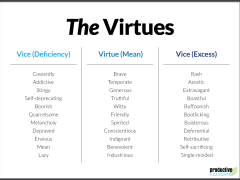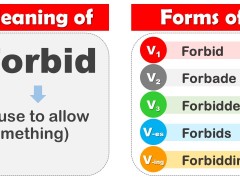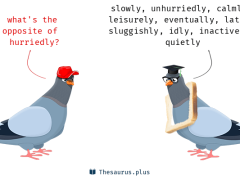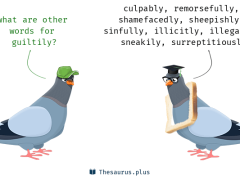reward [riˈwɔːd] n. 报偿
【派】rewarding 能够获得报偿的
【扩】recompense 报酬
【搭】in reward 作为回报
* * *
A: I have got a car of the company as extra reward.
B: Wow, that is great.
A:我得到一部公司的小汽车作为额外的报偿。
B:哇,真是不错的奖励。
* * *
virtue [ˈvəːtʃuː] n. 美德
【搭】have the virtue of 具有……长处
* * *
A: She seems to be very diligent.
B: That's the virtue I admire most.
A:她似乎很勤劳。
B:是的,那是我最欣赏的美德。
* * *
diet [ˈdaiət] n. 节食
forbid [fəˈbid] (forbade [fəˈbeid], forbidden [fəˈbidn]) v. 禁止
【反】permit 允许
* * *
A: The item is forbidden to take.
B: Sorry, I didn't know it before.
A:这是不允许携带的。
B:对不起,我原来并不知道。
* * *
hurriedly [ˈhʌridli] adv. 匆忙地
* * *
A: Why is the machine still here?
B: He left here hurriedly yesterday, and forgot to take it with him.
A:这台机器怎么还在这儿?
B:他昨天离开得很匆忙,忘记带走了。
* * *
embarrass [imˈbærəs] v. 使尴尬
* * *
A: Are you trying to embarrass me?
B: No, it must be a mistake.
A:你想让我尴尬?
B:不,这肯定是个误会。
* * *
guiltily [ˈɡiltili] adv. 内疚地
* * *
A: He said sorry to everybody guiltily.
B: He must have realized the mistake.
A:他愧疚地对每个人说了对不起。
B:他肯定已经认识到了错误。
* * *
strict [strikt] adj. 严格的
【派】strictly 严格地
【扩】stern 严厉的
【搭】be strict with 对……严格
* * *
A: Is your teacher strict with you?
B: Yes, he always asks us to do a lot of homework.
A:你们老师对你们严格吗?
B:是的,他总是让我们做很多家庭作业。
* * *
reward [riˈwɔːd] v. 给奖赏
occasionally [əˈkeiʒənəli] adv. 偶尔地
* * *
A: I like playing football best, but occasionally I play table tennis, too.
B: But I prefer playing table tennis.
A:我最喜欢踢足球,偶尔也打打乒乓球。
B:但我更喜欢打乒乓球。
noun [抽象名词]奖励,回报;赏格,悬赏金;报偿,报应 - You deserve a reward for being so helpful.
verb [vi. 不及物动词]酬谢,奖赏;奖励(行动,品质);(理所当然地)获得,赢得(be rewarded);值得(付出时间或精力) - Winning the match was just reward for the effort the team had made.
give sb. reward 给……报偿
reward sb. with sth. 用……奖赏...
reward sb. for sth. 因为……给某人奖赏
- …reward him for the first prize
noun [抽象名词]高尚的道德,德行;美德,优秀品质;优点,长处;<古>(尤指妇女的)贞操;功效;(传统基督教天使学)道德天使(天国九级制度的第七级)(virtues) - His virtue is patience.
noun [抽象名词]规定饮食;大量单调的活动;日常饮食 - It's never too late to improve your diet.
verb [vi. 不及物动词]节食 - I've been dieting ever since the birth of my fourth child.
adjective [原级]低脂的,低糖的 - ...sugar-free diet drinks.
go on a diet = be on a diet 实行节食
- She's always on a diet—she has issues about food. 她经常节食—她担心吃得太多。
- I'm forever on a diet, since I put on weight easily. 我一直在节食,因为我的体重很容易增加。
- He has been on a diet for as long as any of his friends can remember. 从他的朋友能记得时开始,他就一直在节食。
- We existed on a diet of rice. 我们靠吃大米过活。
- He lived on a diet of junk food. 他把垃圾食品当饭吃。
- He lived on a diet of water and canned fish. 他靠水和罐头鱼为生。
verb [vi. 不及物动词]禁止;使不可能,妨碍 - If something forbids a particular course of action or state of affairs, it makes it impossible for the course of action or state of affairs to happen.
forbid sb. to do sth. 禁止某人做某事
- allow sb. to do sth. 允许某人做某事
- Forbidden City 紫禁城 (被禁止的城市)
- Forbidden fruit 禁果
adverb [方式副词]匆忙地,仓促地 - She hurriedly buttoned (up) her blouse.
verb [vt. 及物动词]使)尴尬,窘迫;使难堪,使为难;<古>妨碍(人,移动,行动);<古>使困难重重,使复杂化 - I didn't want to embarrass him by kissing him in front of his friends.
sth. embarrass sb. ……让……感到尴尬
- You embarrassed me. 你让我感到尴尬
adverb [方式副词]内疚地;有罪地 - He glanced guiltily over his shoulder.
- guiltily conscience 问心有愧
- clear conscience 问心无愧
adjective [原级]要求严格的,严厉的;(命令或规则)必须严格遵守的;严谨的,精确的,严密的;恪守教规的,严格的;完全的,彻底的,绝对的 - She's on a very strict diet.
be strict with sb. 对某人严格
- My father is strict with me.
be strict in sth. 对……严格
adverb [频率副词]偶然,偶尔 - I have a manicure occasionally.
- on the occasion 偶尔
- sometimes 偶尔
- at times 偶尔
- off and on 偶尔
- now and again 偶尔








